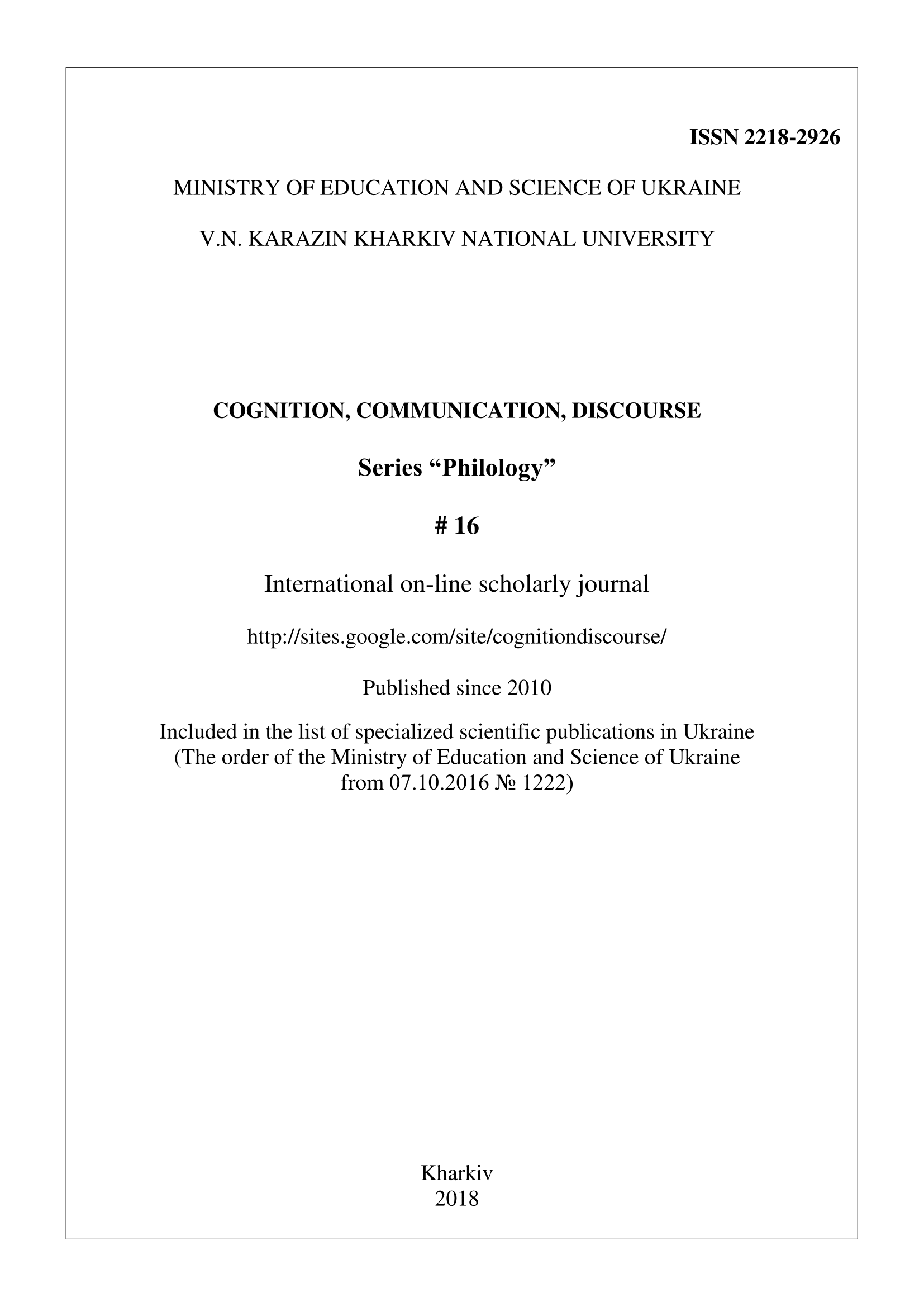Kharkiv linguistic school. Heritage. Alexander Potebnja
Abstract
The article focuses on the scientific heritage of Alexander Potebnja as one of the founders of Kharkiv linguistic school. Potebnja’s seminal books and articles that among many other issues address language origin, human consciousness, and semantics of linguistic units are considered as milestones in the development of state-of-the-art humanities. The article reads his three tenets in terms of philosophy of language and cognitive linguistics. The first tenet concerns correlation between language and thought as a way of accounting for language origin and linguistic abilities of the human. The latter that uses language to communicate his world perceptive experience is ascribed a two-facet nature as both an individual and a nation. This tenet is viewed as one anticipating the underpinning principles of cognitive linguistics and theory of the national construal of the world. The second tenet concerns mental evolution of humanity. Potebnja sees it as a contiguity of image and meaning that diverge evolving in myth, poetry and prose. This tenet is considered as an anticipation of Popper’s Evolutionary Epistemology and Westman’s theory of the ontogenesis of the psyche. The third Potebnja’s tenet focuses on the symbolism of linguistic units. The exclamation and the word are juxtaposed in terms of their internal and external forms. The word and the exclamation are analyzed as signs that render meaning by way of, correspondingly, either indicating to it or symbolizing it. These features suggest conceptual parallelism with Pierce’s semiotic trichotomy of icon, index and symbol.
Downloads
References
Croft, W., Cruse, A.D. (2004). Cognitive Linguistics. Cambridge, New York, Melbourne, Madrid, Cape Town, Singapore, São Paulo: Cambridge University Press.
Evans, V. (2009) How Words Mean: Lexical Concepts, Cognitive Models, and Meaning Construction. Oxford: Oxford University Press.
Evolutionary Epistemology. Stanford Encyclopedia of Philosophy (SEP). Available at: https://plato.stanford.edu/entries/epistemology-evolutionary/
Fizer, J. (1986). Alexander A. Potebnja’s Psycholinguistic Theory of Literature: A Metacritical Inquiry. Cambridge, Massachusetts: Harvard University Press.
Hunnings, G. (1988). The world and language in Wittgenstein’s Philosophy. New York: State University of New York Press.
Kornilov, O.A. (2003). Jazykovye kartiny mira kak proizvodnye nacional'nyh mentalitetov [Language construals of the world as the derivatives of national mentalities]. Izdanie 2-e, ispravlennoe i dopolnennoe. Moscow: CheRo (in Russian).
Liszka, J.J. (1996). A General Introduction to the Semeiotic of Charles Sanders Peirce. Bloomigton and Indianapolis: Indiana University Press.
Munz, P. (2007). The Phenomenon of Consciousness from a Popperian Perspective. In: Consciousness Transitions Phylogenetic, Ontogenetic, and Physiological Aspects. Ed. by Hans Liljenström and Peter Århem. B.V. Elsevier. pp. 307–326.
Nikitin, M.V. (2007). Kurs lingvisticheskoj semantiki [The Course in Linguistic Semantics]. Uchebnoe posobie. 2-e izdanie, dopolnennoe i ispravlennoe. SPb.: Izd-vo RGPU im. A.I.Gercena (in Russian).
Popova, Z.D., Sternin, I.A. (2015). Jazyk i nacional'nye kartiny mira [Language and national construals of the world]. Izd-nie 4-e stereotipnoe, Moskva-Berlin: Direct-Media (in Russian).
Popper, K. (1957/2002). The powerty of Historism. London and New York: Routledge Classics.
Potebnja, A.A. (1962). Obshhij literaturnyj jazyk i mestnye narechija [Common literary language and local dialects]. In: Oleksandr Opanasovich Potebnja. Kyiv. pp. 72–80 (in Ukrainian).
Potebnja, A.A. (1962). Lyst do A.O. Patery [A Letter to A. O. Patera]. In: Oleksandr Opanasovich Potebnja. Kyiv. pp. 93–95 (in Ukrainian).
Potebnja, A.A. (1989). Slovo i mif [Word and myth]. Moscow: Pravda (in Russian).
Potebnja, A.A. (1999/1892). Sobranie trudov. Mysl' i jazyk [Collected Works. Thought and Language]. Moscow: Labirint (in Russian).
Stepanov, Y.S. (2004). Koncept [Concept]. In: Konstanty: Slovar' russkoj kul'tury. 3rd edition. Мoscow: Akademicheskij proekt (in Russian).
Taylor, J.R. (1995). Introduction: On construing the world. In: Language and the Cognitive Construal of the World. Ed. by Taylor, John R. / MacLaury, Robert E. De Gruyter Mouton. pp. 1–22.
Westman, H. (1983). Structure of Biblical Myths: The Ontogenesis of the Psyche. Spring Publications.
Wittgenstein, L. (2003 /1958). The Blue and Brown Books: Preliminary Studies for the 'Philosophical Investigation'. Oxford: Blackwell.
Authors, who publish with this journal, accept the following conditions:
The authors reserve the copyright of their work and transfer to the journal the right of the first publication of this work under the terms of the Creative Commons Attribution License (CC BY), which allows other persons to freely distribute a published work with mandatory reference to the authors of the original work and the first publication of the work in this journal.
Authors have the right to enter into separate additional agreements for the non-exclusive dissemination of the work in the form in which it was published by this journal (for example, to post the work in the electronic institutions' repository or to publish as part of a monograph), provided that the link to the first publication of the work in this journal is given.
The journal policy allows and encourages the authors to place the manuscripts on the Internet (for example, in the institutions' repositories or on personal websites), both before the presentation of this manuscript to the editorial board and during review procedure, as it contributes to the creation of productive scientific discussion and positively affects the efficiency and dynamics of citing the published work (see The Effect of Open Access).




